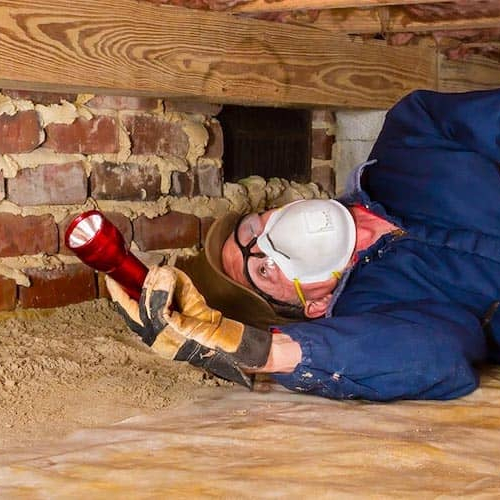What is a reasonable repair request to ask for after a home inspection?
Contributed by Karen Idelson
Aug 8, 2025
•10-minute read

When you buy a home, one of the most important parts of the process is having a home inspection performed by a licensed professional. A home inspection is a thorough examination of property and provides you with a detailed report on the home’s condition. If the home inspection reveals issues that need to be fixed, buyers are able to request that the seller complete repairs as a condition of the sale.
Your ability to negotiate to have repairs done will depend on the type and extent of the issue, the terms of your purchase agreement, and market conditions. Let’s get into what happens after a home inspection, which problems do and do not justify a reasonable repair request, and some tips on negotiating with sellers.
What to do after a home inspection
A home inspection is a visual examination of the physical structure and systems of a home, meant to uncover any hidden problems the buyer may not see themselves. If a home inspection unearths necessary repairs in the property, the buyer can use this to negotiate the home’s price with the seller or to arrange for repairs to be taken care of prior to closing.
After the inspection, a home buyer will review the inspection report to determine whether they want to purchase the house. If the damage is extensive, the buyer can choose to cancel the sale entirely, or they can enter negotiations with the seller.
A home inspection is not to be confused with a home appraisal. While the home inspection examines the home’s condition, the appraisal is an assessment of its fair market value. The appraisal is required by the lender to confirm that the loan amount is appropriate relative to the value of the home. The inspection protects the buyer’s investment so that they don’t purchase a home full of expensive problems that they don’t find out about until they’ve moved in.
You can expect the home inspection report to cover key findings regarding the:
- Exterior structure
- Property grounds
- Interior rooms
- Bathrooms
- Kitchen
- Electrical systems
- Heating and cooling systems
- Plumbing
- Attic
- Basement
Understanding the state of the market
What you do with the results of the home inspection can be impacted by the state of the housing market when you buy. If the current supply of available houses exceeds the demand for them, it’s called a buyer’s market. When this happens, sellers compete over buyers, giving the buyer an advantage when you negotiate. It can be easier to get the seller to agree to cover the cost of repairs in a buyer’s market.
On the other hand, a seller’s market happens when demand for homes exceeds the supply, and buyers have to compete against each other. In a seller’s market, a seller may receive multiple offers from different buyers. When this happens, a seller may be less likely to negotiate based on the results of the home inspection,
When the market shifts, the expectations on inspections and repairs can change significantly, so it’s crucial that you understand whether it’s a seller’s market or buyer’s market. Consider these market shifts as you review the home inspection report to ensure the repairs you’re requesting are in line with the rules of supply and demand.
Economic conditions can also impact what you do with the home inspection report. When inflation is high, prices rise. While this typically drives up the value of homes, it also means higher costs for building materials. This makes the costs of any necessary home repairs more expensive to cover.
Requesting repairs after a home inspection
Following the home inspection, there may be a list of items that require care and repair. You’ll then need to determine which of these repairs are reasonable to request and how you plan to discuss them with the seller. Your real estate agent will play an important role in this process, as they can offer advice and negotiate with the seller’s agent or the seller directly.
Perhaps the biggest reason to request repairs is to mitigate any safety or health risks that could come with living in the home with those issues unresolved. If you paid full price for a home and then moved in only to realize you have to find $10,000 to replace the roof alone, you won’t feel like you’ve gotten a fair deal. If the seller isn’t willing to complete that work before closing, you could at least get them to reduce the purchase price by $10,000 to cover what that work will require. Be sure to get those repair requests in promptly after the home inspection results are in. If you wait too long to ask for the repairs, it could delay your closing.
Keep in mind that it’s important to have an inspection contingency in your purchase agreement with the seller. This means the purchase of the house is contingent on the results of the inspection. If you discover issues during the home inspection and the seller refuses to make repairs or give a discount on the purchase price, the contingency will allow you to back out of the sale and have your earnest money refunded.
Do sellers have to fix everything revealed by home inspections?
Although negotiating home repairs is quite common, it’s important to note that these repairs are not mandatory, and sellers cannot be forced to fix anything from the inspection report.
However, it’s in the seller’s best interest to find a resolution to close the deal. If the home inspection reveals problems that the buyer doesn’t want to deal with or pay for, they could walk away from the sale. In fact, if the buyer included a home inspection contingency in their purchase agreement, then they can cancel the deal without losing their earnest money deposit. Then the seller would have to start over and eat the time and costs of relisting the home.
Two common solutions are to negotiate a lower purchase price or have the seller pay for certain repairs as part of their purchase agreement. While there are certain repairs that are reasonable to request, buyers shouldn’t expect the seller to fix every last thing.
What is a reasonable request for home repairs?
It’s reasonable to request repairs for any problems in the home that lead to health or safety concerns or problems that would require expensive fixes.
Consider the home’s plumbing and electrical systems as well as the roof, main foundation, and structure. If an issue would pose a safety risk or require you to dig deep into your pockets to fix, it’s likely a reasonable repair to request. When in doubt, a real estate agent or REALTOR® will be able to guide you through the home inspection process and help you identify which repairs to request.
Common repairs needed after a home inspection
The most common repairs following a home inspection relate to the home’s key systems and overall structure. Here’s a list of some of the most frequently requested home repairs.
Roofing damage
Broken shingles, leakage, and other roofing damage can be a reasonable repair request, especially since not fixing it can lead to additional home damage. Roof repair typically costs anywhere from $400 to $2,000, while a roof replacement can cost anywhere from $6,000 to $13,000.
Heating, ventilation, and air-conditioning (HVAC) problems
HVAC problems are often a top priority. Depending on the climate where you live, it can be downright dangerous to live in a home without heating or air conditioning. Having a modern and efficient HVAC system can save you money on energy costs, while an older one can cost you, especially in the winter and summer. The cost of HVAC repair can vary from a few hundred to a few thousand dollars. Replacing a dated HVAC system entirely can cost anywhere from $5,000 to $12,500.
Electrical and fire hazards
Electrical and fire hazards are particularly concerning. You want to feel safe in your new home, so things like sparking outlets should be analyzed and repaired as soon as possible. These types of problems can also lead to gas leaks and other dangerous situations, so it’s well within your rights to ask for these issues to be addressed. The cost of electrical repairs can vary from a few hundred dollars for small jobs to several thousand for a major overhaul.
Plumbing issues
Plumbing problems can be more than just the inconvenience of a leaky faucet. Deeper pipe issues or problems with your sewage or septic system can cause major headaches and expensive fixes. Plumbing issues are not the kind you want to wait too long to address. Plumbing repairs can cost anywhere from a few hundred dollars to several thousand dollars, depending on the damage.
Pest infestation
No reasonable seller would expect their buyer to move into their newly bought home only to have to live with pests. Pest problems aren’t only gross, they can also pose health risks and be expensive to fix. Skilled home inspectors will also be able to recognize signs of pest infestation, although in some cases you may need to hire a separate professional to identify pest damage. You can order a separate pest inspection, which provides a specialized search for bugs, rodents, and other living beings in the house that can cause damage and health problems.
The cost of pest control can vary widely depending on the type of pest, extent of the infestation, number of visits required, and type of treatment. For example, the cost to get rid of cockroaches typically ranges from $100 to $600, while it can cost between $1,000 and $4,000 to exterminate bed bugs.
Structural issues
Structural issues cover any problem that affects the structural integrity of your home.
For example, if you notice uneven floors, bowing walls, or water damage in the basement, there could be a problem with your foundation.
If left unfixed, foundation issues can affect the safety and stability of your home and significantly reduce the property value. If you notice any of these signs, it might be worth ordering a separate foundation inspection to see if your foundation has been compromised.
What is an unreasonable request for home repairs?
While some requests are common and completely justifiable, there are also unreasonable buyer requests after inspection. Making unreasonable repair requests can hurt your chances as a buyer, particularly if it’s a seller’s market where you’re facing competition from other buyers. Some purchase agreements even explicitly include that the seller isn’t responsible for certain minor repairs. Here are some repair requests that might not be worth making.
Cosmetic issues
Grease spots, old stains, and chipped paint may not be easy on the eyes, but these are the types of cosmetic issues that are easy enough for a buyer to correct. Asking for minor cosmetic changes can put the home sale in jeopardy if the seller has other offers. Consider planning to fix these minor issues yourself after the sale closes.
Garages, sheds, and extra buildings
Asking to repair a garage, shed, or other type of extra building on the property is also seen as an unreasonable request. This is because the primary structure on the property is the reason you made an offer. Any additional structures are considered extra on top of the main home, and therefore these repairs are not a top priority.
Small cracks in the basement or driveway
Try not to sweat the small stuff. If something as small as a crack in the driveway or basement would deter you from buying a home, you probably shouldn’t be buying that home in the first place. These repairs once again fall into the category of cosmetic issues and aren’t a reasonable repair request.
Loose fixtures
Loose doorknobs, railings, or other fixtures can be inconvenient, but not all that complicated to fix. Providing a short list of crucial repairs is the best way to reach an agreement with the seller, so stay away from nit-picking and consider fixing these issues yourself.
Who pays for the repairs?
Because every case is different, different factors determine who will pay for home repairs after the home inspection. The seller is not required to pay for such repairs, but it can be in their best interest to do so if it means securing the sale. In some cases, the seller may put cash toward the repairs, while other sellers may choose to negotiate a lower sales price instead. Here are the primary factors that will impact who pays for home repairs.
The contract
The purchase agreement that both the buyer and seller have signed may include contingencies in the contract. A home inspection contingency means that if the inspection reveals problems with the home, the buyer can walk away without losing their deposit. If the seller knows the buyer could cancel the deal without penalty, they may be more willing to cover the cost of repairs.
The repair type
The type of repair you request can also determine who covers the costs. Crucial repairs relating to the home’s structure and systems will typically be covered by the seller, as these repairs are considered essential for the home to function properly. Other, less urgent repairs may fall on the buyer.
State regulations and laws
Some states have specific, nonnegotiable laws when it comes to home repairs. For example, some states require the seller to repair problems that pose health or safety risks, like mold, severe water damage, or building code violations. California requires that all water heaters be supported and strapped to prevent movement during an earthquake. Consult with your real estate agent about the rules in your specific state.
Tips for making repair requests
If you have some repairs that you’d like to request from the seller, here are some tips on how to go about it.
- Make sure to document everything. The first question your seller will have upon receiving your repair request will be how much it's going to cost them. A contractor will be able to give you an estimate that you can present to the seller.
- Communicate the request clearly. Work through your real estate agent, who will likely have experience handling post-inspection requests.
- Remain realistic. Asking for cosmetic repairs that are not essential could hurt your negotiations with the seller. Focusing on just the major issues, which present things like safety challenges, will show the seller you are reasonable and keep the deal moving forward.
- Consider closing credits. You can ask the seller to have the repairs completed by the closing day, or you can just get the money to handle them yourself. In many cases, the repair money can come as a credit that brings down your closing costs.
- Work with your real estate agent. Your agent will be able to help you negotiate with the seller and advise you about which repairs may seem reasonable to request.
- Attend the final walk-through. Just before your closing day, you’ll have the final walk-through of the home. This is the time to confirm that any requested repairs have been completed.
- Walk away if you need to. If the home inspection revealed serious issues with the home, and you and the seller can’t agree on a solution, you can back out of the deal.
The bottom line
Remember: don’t sweat the small stuff. Unless you’re buying a newly constructed home, there’s bound to be a few issues and repairs you’ll need to address yourself as the buyer. When considering which repairs are reasonable requests, ask yourself: Is it a health or safety concern? How severe is the damage? How much would it cost to fix the issue yourself?
And remember, your real estate agent is there to make the process as easy for you as possible. They have a wealth of knowledge they can share, so when in doubt, lean on them for guidance.
Looking for a simpler way to purchase a home? Learn more about buying a house as-is.

Rory Arnold
Rory Arnold is a Los Angeles-based writer who has contributed to a variety of publications, including Quicken Loans, LowerMyBills, Ranker, Earth.com and JerseyDigs. He has also been quoted in The Atlantic. Rory received his Bachelor of Science in Media, Culture and Communication from New York University.
Related resources

5-minute read
What is an appraisal contingency and when should I use it?
An appraisal contingency can give home buyers peace of mind about a home's purchase price. Learn how appraisal contingencies work and when to use one.
Read more

6-minute read
What is a 4-point inspection?
A 4-point inspection looks at a property's four major systems. Learn more about what a 4-point inspection is and why you may need one before purchasing a home.
Read more

7-minute read
A buyer's home inspection checklist
Inspections verify the safety and integrity of a buyer’s future home. Here’s a buyer’s home inspection checklist with all the key informati...
Read more